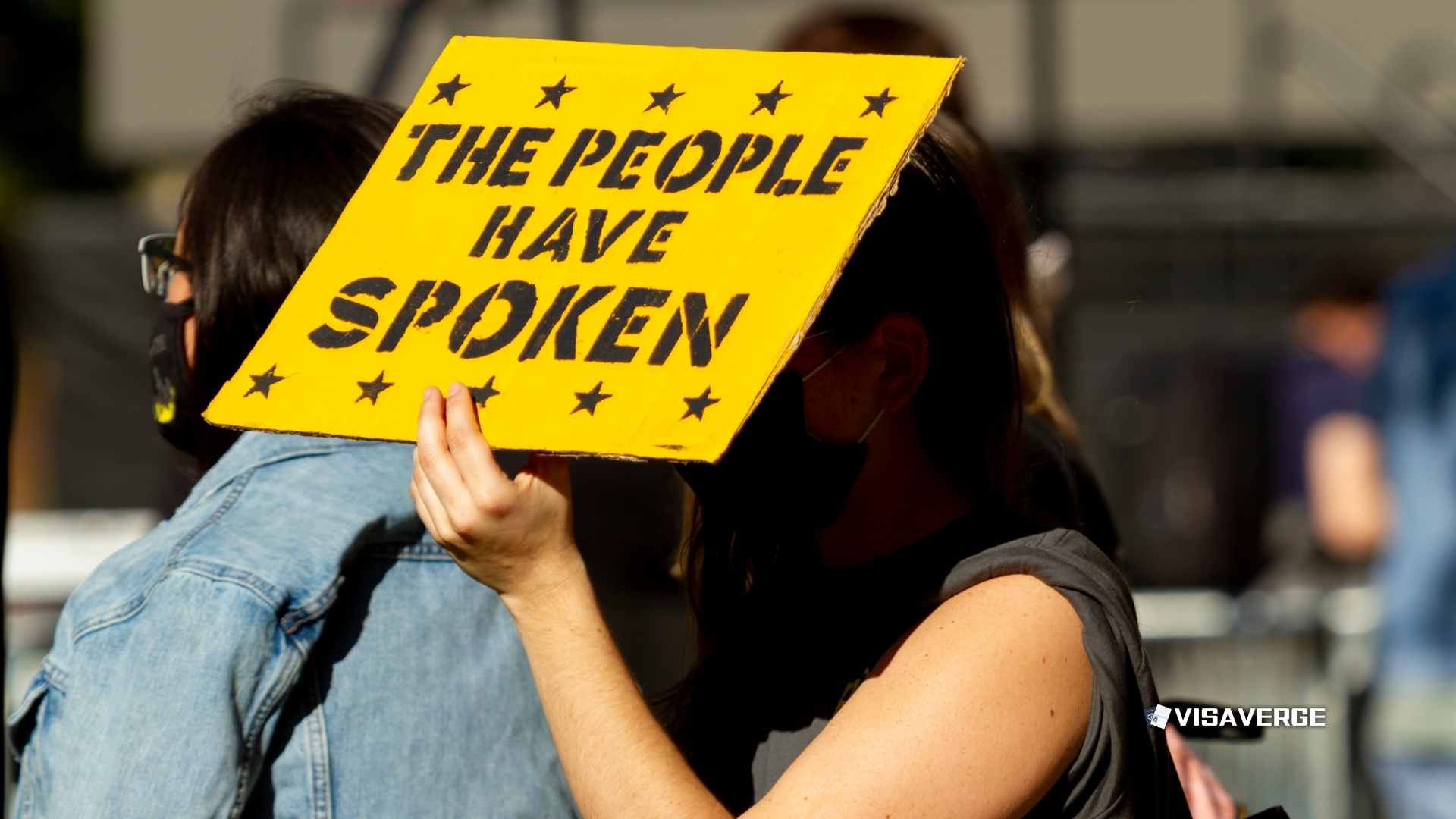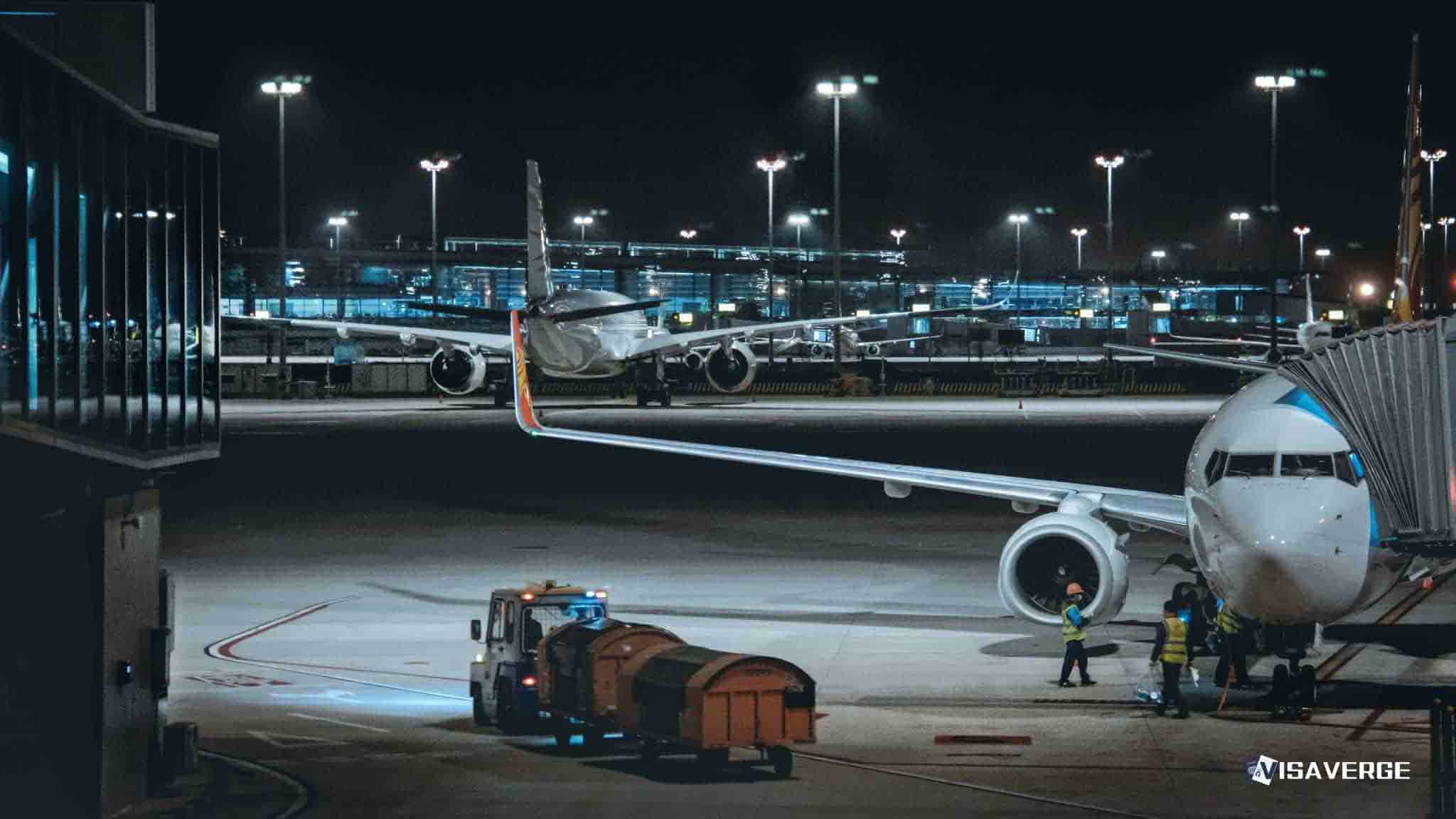(HUNDREDS of protesters gathered outside the Britannia International Hotel in Canary Wharf on August 17, 2025, after police arrested a migrant staying there on suspicion of assault, bringing renewed focus to the government’s use of asylum hotels and the strain on local communities.) The Metropolitan Police said six people were arrested during the demonstration for breaching Section 14 Public Order conditions, possession of Class B drugs, and assaulting an emergency worker.
Officers set conditions to keep crowds on the pavement opposite the hotel to prevent serious disruption, as tensions over asylum accommodation intensified through July and August. The hotel, set along the docks in Canary Wharf, has seen repeated protests in recent weeks; some events drew up to 2,000 people, including anti-immigration groups and counter-protesters.

On Saturday, demonstrators waved England flags, set off pink flares, and held banners reading, “We’re not far right but we’re not far wrong. Don’t gamble with our lives. Stop the boats.” Police said the restrictions were used to balance free expression with public safety — a now-regular policing challenge outside asylum hotels across England in 2025.
Police response and arrests
The Metropolitan Police imposed Section 14 conditions to reduce disruption and keep opposing groups apart, directing protesters to stay in a set area outside the Britannia International Hotel. Officers made six arrests linked to public order and drug offences, and for assaulting an emergency worker.
The force has increased its presence near hotel sites amid rising tensions and has warned it will continue to use lawful powers to manage protests when there is a risk of serious disorder. Information about protest conditions and policing powers is available on the Met’s official advice page: https://www.met.police.uk/advice/advice-and-information/protests/
The protest followed the arrest of a migrant living at the hotel on suspicion of assault, which police said would be handled through a standard criminal investigation. If charged, the person could be detained or released on bail. Under Home Office policy, the case outcome can affect an individual’s asylum claim, but the process remains separate from the criminal court proceedings.
Community groups at the scene urged residents not to generalise from a single incident, while critics of the government said the use of hotels has created flashpoints that make both migrants and neighbours feel unsafe.
Local impact and conditions for hotel residents
Residents in Canary Wharf said the rolling demonstrations, heavy policing, and social media rumours have unsettled the area. Counter-protesters — including local residents and migrant rights groups — argued that misinformation is inflaming the situation.
Recent reporting has debunked viral claims that asylum seekers receive luxury rooms or free goods. Investigations also found that people housed in hotels often receive less than £10 per week in support and face long periods of isolation with little access to work, study, or community life. Advocates say those conditions can leave people anxious and cut off, and make the neighbourhood feel on edge.
Key points about hotel accommodation:
– Many residents receive very low financial support (often under £10/week).
– Long periods of isolation and limited access to work or education.
– Heightened feelings of vulnerability among asylum seekers due to protests and local tensions.
– Local communities experience unease from repeated demonstrations and increased police presence.
Policy context and community impact
The latest demonstration in Canary Wharf fits a wider pattern. Anti-migrant unrest has grown across England this year, even as the government tightened migration policy in 2024–2025.
Officials have:
– Expanded returns cooperation with France for people arriving by small boats.
– Relied more on private contractors (including Serco) to manage accommodation.
Ministers argue these steps are needed to secure the border and deter dangerous crossings. But critics say the approach has not eased community tensions or fixed the asylum backlog, and that hotels are a costly, short-term fix that harms both asylum seekers and local trust.
Former immigration minister Robert Jenrick said on August 17 that the frequency and scale of protests show the British public has “snapped” over the government’s handling of migration and asylum accommodation. His comments echoed frustration voiced by protesters in Canary Wharf, who cited public safety concerns, pressure on local services, and a lack of clear information from the Home Office.
Counter-protesters said the anger is being stoked by online campaigns and false claims about hotel conditions and benefits. They warned that turning hotels into political battlegrounds risks further harm to people who fled war or persecution.
Who’s involved
- Protesters worried about crime, costs, and government transparency. Some are openly anti-immigration; others say they are not partisan but want change.
- Counter-protesters made up of residents, anti-racist groups, and migrant advocates. They argue the protests fuel stigma and fear, and say most hotel residents want safety and a fair decision on their cases.
- Police balancing free speech and public order, using legal powers to set conditions when there is a risk of serious disruption or violence.
- Asylum seekers who report feeling isolated, watched, and sometimes threatened, both by the protests and by life inside hotels with limited support.
Analysis and proposed alternatives
Analysts say the mix of tougher policies, slow decision-making, and heated rhetoric from both far-right and mainstream figures has created a volatile environment around asylum hotels. The UK–France return deal is expected to cut new arrivals, but it has not calmed local unrest or reduced the backlog already in the system.
Investigative pieces and community reports point to a common view: the hotel model is failing. Calls for alternatives include:
1. Smaller reception centres closer to services and communities.
2. Faster asylum case decisions to reduce time in temporary accommodation.
3. Better community support and clearer communication from the Home Office.
According to analysis by VisaVerge.com, sustained reliance on hotel accommodation has widened the gap between national policy goals and local consent, leaving both residents and asylum seekers to pay the price in daily life. Local leaders want:
– A clear exit plan from hotel use.
– A timeline for moving people into stable housing.
– More regular updates from the Home Office on placements, security measures, and support services.
Practical effects and outlook
For now, the practical effects are clear:
– More police at hotel locations and continued use of protest restrictions.
– Rising pressure on ministers to phase out hotels quickly and invest in long-term housing solutions.
– No major policy overhaul announced as of August 18, 2025, despite calls from councils, charities, and MPs.
As the criminal case linked to the Canary Wharf arrest proceeds, officials urge the public not to conflate one investigation with the entire asylum system. Legal experts note that criminal cases are handled by the courts, and asylum claims follow separate rules set by the Home Office.
The symbolism of a high-profile arrest outside a hotel has turned the Britannia International into a stage for wider anger over borders, budgets, and identity.
Without faster decisions and credible alternatives to large hotel sites, protests like Saturday’s are likely to continue into the autumn, drawing crowds to doorsteps where people already feel exposed.
This Article in a Nutshell
Hundreds gathered at Britannia International Hotel on August 17, 2025, after a migrant’s arrest. Six people were detained under Section 14 and other charges. The event highlighted asylum hotels’ strain: under £10 weekly support, isolation, and rising protests. Calls grow for faster decisions, smaller centres, and a clear exit from hotel use.






